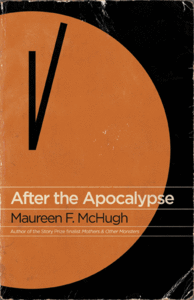Take a photo of a barcode or cover
I loved everything about this collection. Maureen McHugh delivers again.
This is a very different look at the post-apocalyptic story. We often read about the devastating apocalypse that we were ill equipped to handle and the strife that follows. This collection; however, was filled with stories following apocalyptic events that were not as immediately catastrophic, how daily life was changed because of them and how people are moving on with their lives. I loved the selection of locations globally, the cross section of society our MCs represented, and the general writing style of the author. I love how the different apocalyptic scenarios were presented and how some of them were not as obvious. These stories were beautiful, short, and impactful.
I strongly recommend to fans of sci-fi and apocalyptic stories.
This is a very different look at the post-apocalyptic story. We often read about the devastating apocalypse that we were ill equipped to handle and the strife that follows. This collection; however, was filled with stories following apocalyptic events that were not as immediately catastrophic, how daily life was changed because of them and how people are moving on with their lives. I loved the selection of locations globally, the cross section of society our MCs represented, and the general writing style of the author. I love how the different apocalyptic scenarios were presented and how some of them were not as obvious. These stories were beautiful, short, and impactful.
I strongly recommend to fans of sci-fi and apocalyptic stories.
challenging
dark
reflective
medium-paced
Strong character development:
No
Loveable characters:
Complicated
Diverse cast of characters:
Yes
Flaws of characters a main focus:
Yes
Short story collections are so hard to sum up. For the first 5 stories I would have said I loved this book completely, but the latter 4 were just kind of eh for me. Not bad, but the stories I loved I really really loved, so the others felt less compelling by comparison, perhaps? Anyway, would still recommend, esp the first half.
It starts out with some pretty strong stories, but it slows down towards the end and becomes quite bland.
The good news is, many of us will survive the various end-of-the-world scenarios that befall mankind in this fascinating short story collection; it is also the bad news. For those who fear the end of order that the cataclysm foretells, there is the comfort of knowing that at the micro-level of our individual lives, friends and family will continue to disappoint, personalities will follow dependable trajectories, and the basics of existence will remain the same: find food, avoid danger, live to see another day. But that comfort is also a strait-jacket, and McHugh offers little in her worldview to those who believe that when the end comes, they'll take that leap and do something heroic, or act on a socially-suppressed evil thought, or leave the world in their own way. The stories in this collection range from zombie take-over, to "Colossus; The Forbin Project"-like computer system sentience, to bird-flu decimation. The sheer number of ways in which McHugh indulges her imagination is bracing, but even more admirable is her focus not on the event itself, or it's god's-eye view of the collapse that happens in the aftermath, but on the myriad ways in which the individual carries on and adapts to the changing landscape. In McHugh's worlds, not only cockroaches and Cher survive...the human animal does as well, for better or worse.
McHugh is a fabulous writer. In just a few spare words, she creates a story, an alternate world, and multi-dimensional characters that evoke an emotional response. She has a marvelous skill at developing a story and organically taking it in an unexpected direction, all without employing typical surprise endings.
The Naturalist: After the zombie apocalypse, zombies are largely eradicated from the cities, but remain at prison encampments. One of the prisoners starts wondering about zombies. To the reader, it becomes apparent humans remain the real problem. I enjoyed it a great deal, despite strong overtones of horror.
Special Economics: A story about a young woman seeking work in the big city in a post-revolution, post bird-flu China. A complex, layered story about living in the moment, social categorization, families, and resourcefulness. One of my favorite stories. "Why hadn't she noticed that in the restaurant? Maybe because when you are afraid, you notice things. When your father is dying of the plague, you notice the way the covers on your mother's chairs need to be washed. You wonder if you will have to do it, or if you will die before you have to do chores."
Useless Things: A solitary doll-maker, good-hearted person inadvertently becomes a way-station on the migrant trail and realizes her risk. Nicely captures the feeling of solitude, but I was so distracted by the dildos that I had trouble finding the larger message.
The Lost Boy: A Reporter at Large: A reporter covers the story of a boy who emerged in another town after disappearing on a school trip. Two dirty bombs exploded in the city, and in the chaos, the boy disappeared. An interesting twist on the theme of amnesia lifestyle, so popular in the forty-something chick-lit genre.
The Kingdom of the Blind: two computer specialists speculate on whether or not their program running a multi-hospital system is demonstrating awareness. Interesting intellectual discussion on definitions of 'aware' contrasting with their own humanity.
Going to France: The narrator experiences a sudden, fierce urge to travel to France after delivering a boat of flying people out into the middle of the ocean. Interesting lack of detail regarding the flying people that contrasts with the concrete, miniscule details of the airport. I found it interesting for the emotion stemming from the airport experience.
Honeymoon: A small-town girl and her small-town boyfriend on the eve of their marriage, when she suddenly realizes what she is doing. Establishing financial independence means volunteering as a medical test subject to earn money. Did not end where I expected. I thought the characters were amazingly well developed, even the slight few in the test environment.
The Effect of Centrifugal Forces: The daughter of a woman with Avian Prion Disease (the bird equivalent of mad-cow disease, apparently) deals with family dynamics and changes in her mother. Moving, yet the one that I had the most trouble reading and enjoying due to continuity issues. It felt largely like it could have used one more thorough editing, with a little more thought to the short story form.
After the Apocalypse: A woman and her young teenage daughter head north to Canada hoping for security after the world falls apart. A typical apocalypse set-up, but done with unusual emotional tone and reaction. "Especially not Canada, which she is deeply but silently certain is only a rumor. Not the country, she doesn't think it doesn't exist, but the camp. It is a mirage. A shimmer on the horizon. Something to go toward but which isn't really there."
A four an a half star collection? Why not the final push to five? Because although McHugh writes in a seamless, spare manner, I would love just a little more hope, a little more sunshine in the apocalypse, and just a little more from editing and enjoyment.
The Naturalist: After the zombie apocalypse, zombies are largely eradicated from the cities, but remain at prison encampments. One of the prisoners starts wondering about zombies. To the reader, it becomes apparent humans remain the real problem. I enjoyed it a great deal, despite strong overtones of horror.
Special Economics: A story about a young woman seeking work in the big city in a post-revolution, post bird-flu China. A complex, layered story about living in the moment, social categorization, families, and resourcefulness. One of my favorite stories. "Why hadn't she noticed that in the restaurant? Maybe because when you are afraid, you notice things. When your father is dying of the plague, you notice the way the covers on your mother's chairs need to be washed. You wonder if you will have to do it, or if you will die before you have to do chores."
Useless Things: A solitary doll-maker, good-hearted person inadvertently becomes a way-station on the migrant trail and realizes her risk. Nicely captures the feeling of solitude, but I was so distracted by the dildos that I had trouble finding the larger message.
The Lost Boy: A Reporter at Large: A reporter covers the story of a boy who emerged in another town after disappearing on a school trip. Two dirty bombs exploded in the city, and in the chaos, the boy disappeared. An interesting twist on the theme of amnesia lifestyle, so popular in the forty-something chick-lit genre.
The Kingdom of the Blind: two computer specialists speculate on whether or not their program running a multi-hospital system is demonstrating awareness. Interesting intellectual discussion on definitions of 'aware' contrasting with their own humanity.
Going to France: The narrator experiences a sudden, fierce urge to travel to France after delivering a boat of flying people out into the middle of the ocean. Interesting lack of detail regarding the flying people that contrasts with the concrete, miniscule details of the airport. I found it interesting for the emotion stemming from the airport experience.
Honeymoon: A small-town girl and her small-town boyfriend on the eve of their marriage, when she suddenly realizes what she is doing. Establishing financial independence means volunteering as a medical test subject to earn money. Did not end where I expected. I thought the characters were amazingly well developed, even the slight few in the test environment.
The Effect of Centrifugal Forces: The daughter of a woman with Avian Prion Disease (the bird equivalent of mad-cow disease, apparently) deals with family dynamics and changes in her mother. Moving, yet the one that I had the most trouble reading and enjoying due to continuity issues. It felt largely like it could have used one more thorough editing, with a little more thought to the short story form.
After the Apocalypse: A woman and her young teenage daughter head north to Canada hoping for security after the world falls apart. A typical apocalypse set-up, but done with unusual emotional tone and reaction. "Especially not Canada, which she is deeply but silently certain is only a rumor. Not the country, she doesn't think it doesn't exist, but the camp. It is a mirage. A shimmer on the horizon. Something to go toward but which isn't really there."
A four an a half star collection? Why not the final push to five? Because although McHugh writes in a seamless, spare manner, I would love just a little more hope, a little more sunshine in the apocalypse, and just a little more from editing and enjoyment.
This falls exactly in between two of my strongest reading preferences:
apocalypse, yay! and short stories, boo!
and therefore it was a definite three-star book for me. So...there you go.
apocalypse, yay! and short stories, boo!
and therefore it was a definite three-star book for me. So...there you go.
AAAHHH NEW MAUREEN MCHUGH AAAHHHH DISCOVERED THE DAY I FINISHED EXAMS. Christmas came early for me this year. Having immense difficulty getting anything done because all I want to do is lie on the couch and keep reading this.



